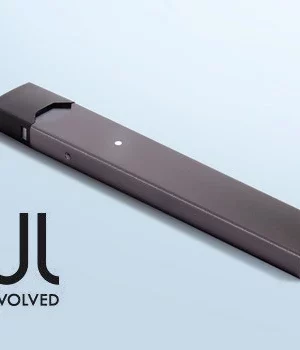
Juul Labs Inc. was founded in 2017 by two design students from Stanford University, James Monsees et Adam Bowen. At the time, both men smoked. They wanted to create “a world where fewer people smoked cigarettes” and where smokers would have access to “the tools they needed to cut down or completely stop using tobacco“.
Convinced that vaping could have “a positive impact on smokers’ health” but “a negative impact on the health of non-smokers“, the students started their company to try – in their own words – to “maximise the positive and minimise the negative”.
Their wish was realised in a pod called the Juul.
Success
Within a few short years, the men’s new company had shot to fame.
Thanks to their stylish, discreet and financially accessible pod (it’s $50 for the starter kit), they carved out a space for themselves in the US vape market, to the point where they now occupy 70% of it and have been largely responsible for plummeting turnover in the USA tobacco industry.
Their success led to the company being valued at no less than 15 billion dollars..
Problems
Although the company’s founders achieved their aim of creating a tool to reduce smoking-related risks, their success has not come without its problems.
In fact, the product’s design – it looks like a memory stick – and the sweet e-liquid they sell have led so many young Americans to take up the pod that the FDA recently said several million teenagers regularly use to consume nicotine on that side of the Atlantic.
Scott Gottlieb – Commissioner of the FDA – has referred to an activity known in the American media as juuling as a vaping epidemic among young people and a public health tragedy. He’s even considering introducing new policies that might ban the sale of sweet e-liquids.
To address this issue, the US health agency has launched a massive action plan to reduce the number of minors who vape in the U.S. This would involve introducing a number of measures, such as more stringent age checks for anyone buying vape products, withdrawing all sweet e-liquids from certain retail outlets and withdrawing mentholated combustible cigarettes from the market. This is backed up by a second action plan, created by Juul itself.
The company intends to follow its plan to the letter and even defend it in court if necessary.
Update, 19 September 2019: Kevin Burns – the long-time Juul CEO – announced he was leaving the company. He was replaced by KC Crosthwaite, a former employee of the tobacco company Altria.
Update, 30 October 2019: Following health problems experienced by a large number of vapers in the USA, the company announced it was withdrawing sweet e-liquids from sale there. This decision came just days after a press release announcing that the company was cutting 500 jobs. This was the first sign that all was not well at Juul.
The same day, Juul became embroiled in legal action when one of the company’s former senior managers, Siddharth Breja, accused the firm of selling e-liquid cartridges he claimed were “contaminated”, but gave no further details on the matter.
Update, 06 November 2019: Problems were mounting for the pod giant. That Wednesday, Altria – which had invested 12 billion dollars in Juul just a few months earlier – revised its investment downwards and published losses of 4.5 billion.
Update, 14 November 2019: In light of the results of two inquiries confirming continued growth in the numbers of young people vaping in the USA, coupled with the fact that they seemed particularly attracted to mint e-liquids, Juul announced it was withdrawing its mint-flavoured products from the American market. The pod maker now only sells 3 flavours in the US. That’s a huge drop compared to the ten they used to sell.
Update, 20 November 2019: No end in sight for Juul’s problems. The same day, the states of New York, California and North Carolina all announced law suits against the manufacturer. They accused the giant of having “glorified vaping” while “downplaying the presence of nicotine in its products“. What’s more, they held that “aggressive advertising by Juul” had “significantly contributed to the public health crisis that has made young people in New York and the country dependent on its products.” A few days later, on 03 December, the District of Columbia in Washington State joined the legal action.
Update from 31 January 2020: Things go from bad to worse. On this day, Altria announced losses of 4.1 billion dollars, which reduced the value of Juul Labs Inc. to a third of what the Marlboro maker had initially invested. The terms of the contract between them also changed: from then on, Altria would stop helping with the distribution of Juul products.
Update, 04 September 2020: Juul looked set to crumble. The company had recently announced it would slash new jobs and withdraw from multiple new markets across Europe and Asia.
Update, 03 November 2020: The company’s value plummeted to 10 billion dollars. That was a very different figure from the 38 billion it had been worth 2 years earlier.
Update, 07 July 2021: The New York Times claimed that without FDA authorisation to keep selling its products on US soil, Juul might fail.
Juul in France
Juul is just getting established in France.
Although the company was talking a few months ago about potentially launching a bluetooth pod on the French market, in the end it decided just to launch its original product in the meantime. Juul presented it at a launch party on 06 December 2018 at a prestigious Paris hotel, giving us the opportunity to meet and interview the directors.
Read our interview with Juul’s directors the day before the product’s official launch in France.
Update, 04 May 2020: Juul’s French venture was short lived. One of the directors announced the firm’s intention to pull out of the French market, as well as out of Belgium, Spain, Austria and Portugal before the end of 2020. They blamed financial results that were just too different from their expectations.
The paradox
Since the company began, its founders have consistently stated that their main desire is to combat tobacco.
However, that didn’t stop Juul from selling a 35% share of the company to cigarette maker Altria at the end of December 2018.
Juul asserted that this new partnership would allow it to reach out to even more smokers, as the CEO explained in a press release:
“Altria will give JUUL access to its retail shelf space for innovative tobacco products and allow JUUL’s tobacco and menthol-based products to be displayed alongside combustible cigarettes. Altria will allow JUUL to reach out to adult smokers by directly advertising on cigarette pack inserts and mail shots to adult smokers in the databases belonging to Altria and its companies. Altria will also use its logistics and distribution experience to help JUUL expand its reach and impact, and JUUL will have access to Altria’s sales network, which covers more than 230,000 retail locations.”











